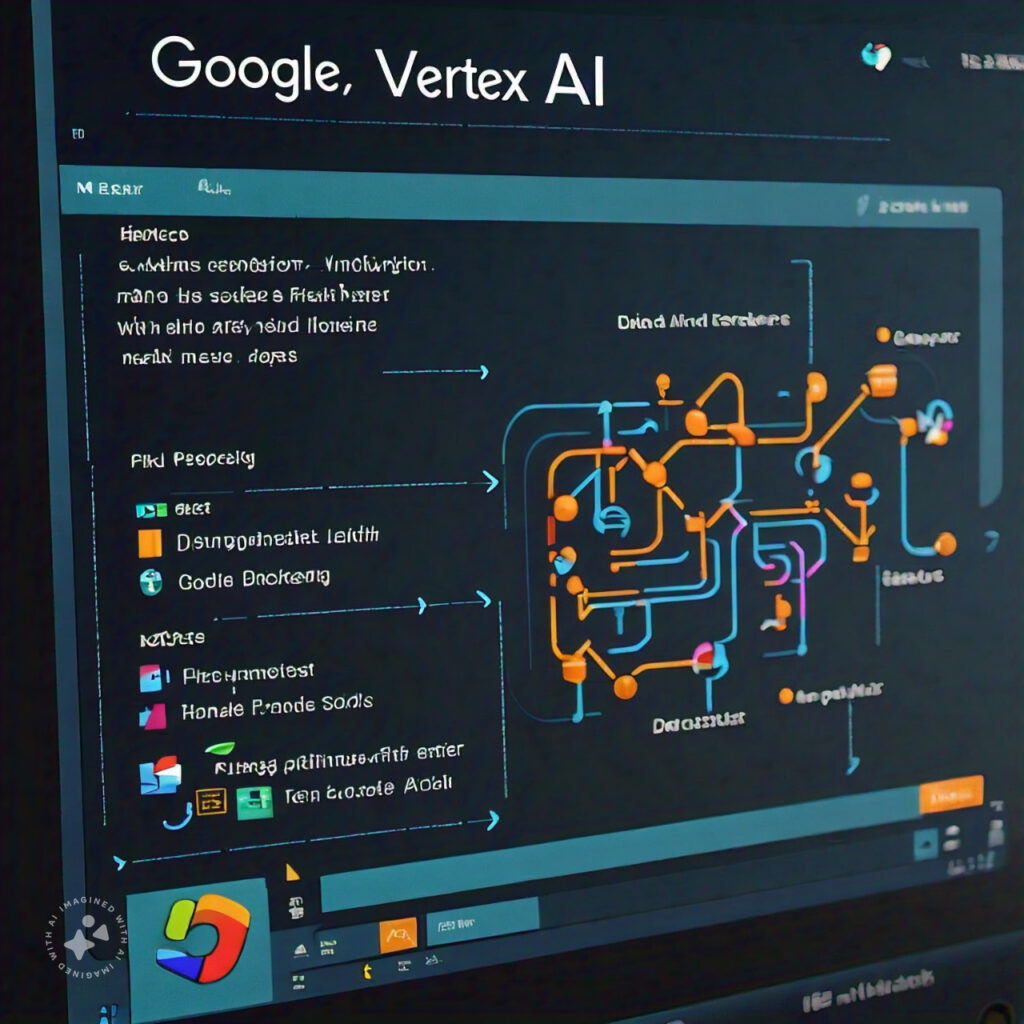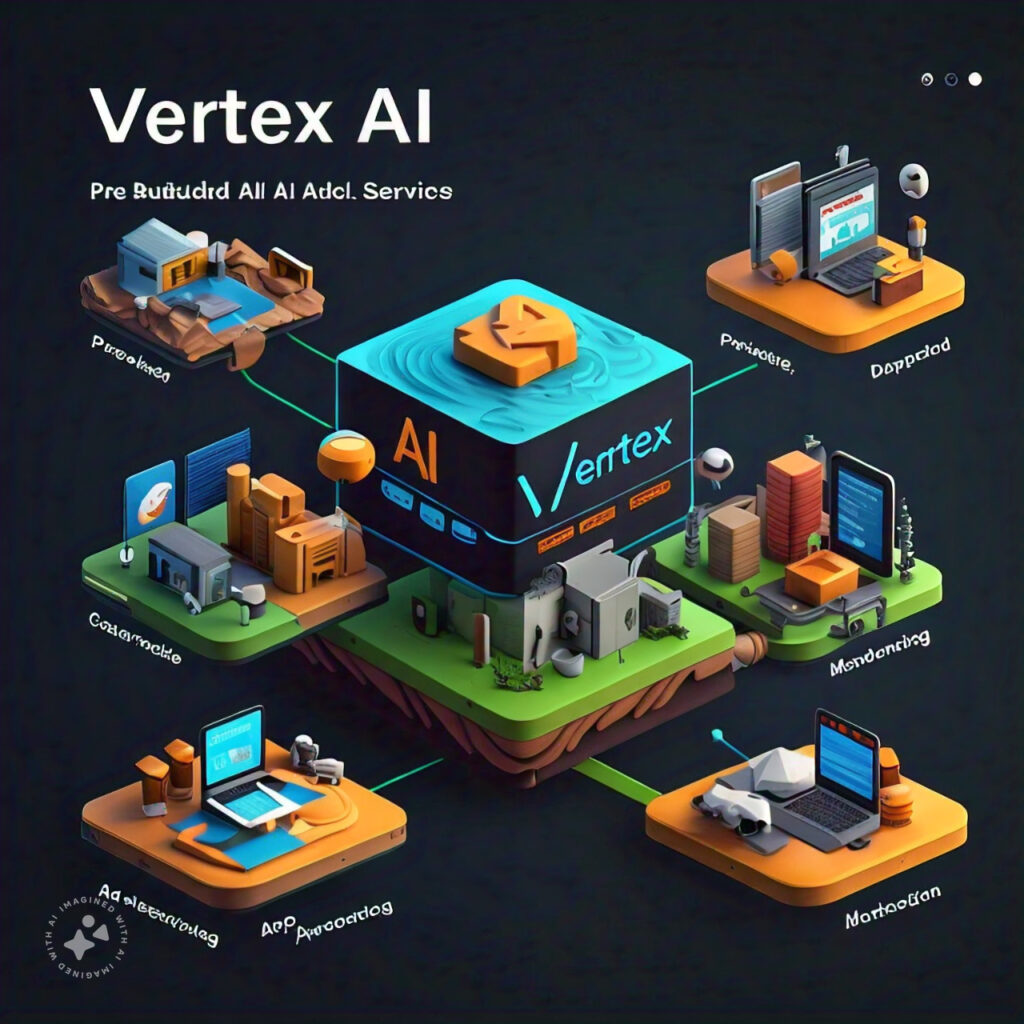
Vertex AI! Imagine a world where data isn't just a collection of numbers, but a treasure trove of insights waiting to be unlocked.
A world where businesses can leverage the power of machine learning (ML) to make smarter decisions,
predict customer behavior, and optimize operations. This isn't science fiction – it's the reality we're rapidly approaching.
 Caption: A sleek, modern office space with high-tech computers displaying intricate data visualizations and machine learning algorithms.
Caption: A sleek, modern office space with high-tech computers displaying intricate data visualizations and machine learning algorithms.The demand for ML solutions is skyrocketing. A recent study by predicts the global machine learning market to reach a staggering $209.31 billion by 2028,
reflecting a compound annual growth rate (CAGR) of 38.8%. Why the surge?
Because businesses are hungry for insights hidden within their data – insights that can help them gain a competitive edge.
But here's the challenge: building and deploying ML models has traditionally been a complex and resource-intensive process, often requiring a team of specialized data scientists.
This has locked out countless businesses and individuals who lack the technical expertise or budget to leverage this powerful technology.
Enter Managed Machine Learning Platforms (MLaaS). These cloud-based platforms democratize ML by providing a user-friendly interface and pre-built tools,
making it easier than ever to build, train, and deploy ML models – even without a PhD in statistics!
Remember that time you spent hours pouring over spreadsheets trying to predict customer churn? With MLaaS,
you could have trained a simple model in a fraction of the time, identifying key patterns in your data that can help you retain valuable customers.
But with so many MLaaS options available, how do you choose the right one for your needs? Buckle up,
because this article will be your guide to navigating the exciting world of MLaaS, with a special focus on Google's Vertex AI platform.
This comprehensive guide will not only demystify Vertex AI, but also explore its features, benefits, and how it compares to the competition.
We'll delve into real-world success stories and equip you with a framework for making an informed decision about whether Vertex AI is the key to unlocking the power of ML for your business.
So, are you ready to unleash the hidden potential within your data? Let's dive in!
Unveiling Vertex AI: Google's Cloud-Based Machine Learning Ally
Vertex AI in a Nutshell:
Imagine having a personal chef specializing in creating intelligent machines – that's essentially what Vertex AI is!
It's a cloud-based platform from Google that simplifies the entire machine learning process, making it accessible to a wider range of users.
 Caption: A close-up of a computer screen showcasing the Google Vertex AI interface.
Caption: A close-up of a computer screen showcasing the Google Vertex AI interface.Here's a breakdown of the user journey with Vertex AI, using a relatable analogy:
- Preparing Ingredients (Data): Just like a chef gathers fresh ingredients for a recipe, Vertex AI helps you prepare your data for building an ML model. This might involve tasks like cleaning and organizing your data, ensuring it's in the right format for the model to understand.
- Training the Chef (Model Training): Think of model training as teaching your chef a new recipe. Vertex AI offers various tools to train your model, including pre-built options (AutoML) for common tasks like image recognition or sentiment analysis, or the ability to build custom models from scratch for more specific needs.
- Opening Your Restaurant (Deployment): Once your model is trained, it's time to put it to work! Vertex AI provides easy deployment options to integrate your model into real-world applications. This could involve deploying it to a website, mobile app, or even connecting it to other cloud services.
- Monitoring Customer Satisfaction (Monitoring): Just like a chef monitors customer feedback to refine their dishes, Vertex AI allows you to monitor your model's performance. This helps you identify any potential issues and continuously improve the accuracy and effectiveness of your model over time.
Infographic
Vertex AI Overview
Google's cloud-based platform simplifying the entire machine learning process
Pre-built AI Services
Ready-made models for common ML tasks like image recognition and sentiment analysis
Custom ML Model Training
Build tailored models from scratch with AutoML and custom containers
Deployment & Monitoring
Seamlessly deploy models and monitor performance in real-time
User-Friendly Interface
Intuitive design with drag-and-drop functionality for easy model development
Scalability
Highly scalable to handle large datasets and complex models
Explainable AI
Tools for improving transparency and interpretability of ML models
Future Trends
Focus on democratization of AI, low-code solutions, and increased automation
Vertex AI by the Numbers:
According to a recent study by , over 80% of businesses believe that AI will be a critical driver of their future success.
Vertex AI empowers businesses of all sizes to tap into this potential by democratizing machine learning.
A Glimpse into the Vertex AI Interface:
The Vertex AI interface is designed to be user-friendly and intuitive, even for those with limited technical expertise.
It offers a visual workflow that guides you through each step of the machine learning process, making it easy to build, train, and deploy your models.
Beyond the Analogy:
While the chef analogy provides a helpful starting point, it's important to understand that Vertex AI goes beyond basic functionalities.
It offers advanced features for experienced data scientists, such as custom container deployment for maximum control over the training environment,
and integration with other Google Cloud services for a comprehensive data-to-action pipeline.
By offering a blend of user-friendliness and powerful features, Vertex AI caters to a broad spectrum of users, from beginners to seasoned data science professionals.
Deep Dive into Vertex AI's Toolbox:
Vertex AI equips you with a versatile toolkit for building and deploying machine learning models. Let's delve into its core functionalities:
 Caption: An infographic visualizing Vertex AI's features: pre-built AI services, custom model training, deployment, and monitoring.
Caption: An infographic visualizing Vertex AI's features: pre-built AI services, custom model training, deployment, and monitoring.1. Pre-built AI Services: Your Arsenal of Ready-Made Chefs
Just imagine having a team of pre-trained chefs specializing in various culinary tasks. Vertex AI's pre-built AI Services function similarly,
offering a collection of pre-trained models for tackling common ML challenges. These models are built and trained on massive datasets by Google,
saving you significant time and resources compared to building models from scratch.
Here's a taste of what's on the menu:
- Image Recognition: Identify objects and scenes within images, perfect for applications like product recommendations in e-commerce or automated image classification in healthcare. (e.g., A 2022 study by found that image recognition can improve customer satisfaction in retail by 19% through personalized product recommendations.)
- Sentiment Analysis: Understand the emotional tone of text data, such as customer reviews, social media posts, or survey responses. This can be invaluable for gauging customer sentiment and improving brand reputation. (e.g., According to , 72% of customers say that positive social media interactions increase their brand loyalty.)
Beyond Vertex AI Services: It's important to note that Vertex AI integrates seamlessly with Google Cloud AI Services, offering an even wider range of pre-built solutions for more specialized tasks.
This comprehensive library allows you to tackle various challenges, from natural language processing to speech recognition and video analysis.
Vertex AI Workflow Timeline
Vertex AI Workflow Timeline
Previous
Next
2. Custom Machine Learning Model Training: Craft Your Signature Dishes
While pre-built models offer a convenient starting point, Vertex AI empowers you to create your own custom models from scratch.
This is ideal for scenarios where you have unique data or require a highly specialized solution tailored to your specific needs.
Here are the key ingredients in your custom model development kitchen:
- AutoML: Your AI Sous Chef: Don't have extensive data science expertise? No problem! Vertex AI's AutoML offering acts as your AI sous chef, automating many of the model training tasks. It can efficiently explore different algorithms and hyperparameters to find the optimal configuration for your data, accelerating the development process.
- Custom Containers: Maximum Control for Experienced Cooks: For seasoned data scientists, Vertex AI provides the flexibility of using custom containers. This allows you to leverage your preferred machine learning frameworks and libraries, offering maximum control over the training environment.
3. Deployment & Monitoring: From Kitchen to Table – Putting Your Model to Work
Once your model is trained, it's time to unleash its potential in the real world. Vertex AI streamlines the deployment process,
allowing you to integrate your model into various applications with ease.
Here's how Vertex AI serves your dishes:
- Easy Deployment Options: Deploy your model to a variety of environments, including web applications, mobile apps, or serverless functions. Vertex AI offers flexible deployment options to seamlessly integrate your model into your existing workflows.
- Real-Time Performance Monitoring: Just like monitoring customer feedback in a restaurant, Vertex AI allows you to continuously monitor your model's performance in real-time. This includes tracking metrics like accuracy, precision, and recall, enabling you to identify areas for improvement and ensure your model remains effective over time.
By providing a combination of pre-built AI services, user-friendly tools for custom model development, and robust deployment options,
Vertex AI empowers you to build, train, and deploy ML models that solve real-world business problems.
Vertex AI vs. The Competition
The MLaaS landscape is brimming with innovation, with several platforms vying for your attention.
Here, we'll compare Vertex AI with two of its major competitors: Amazon SageMaker and Microsoft Azure Machine Learning.
 Caption: A highly detailed scene showing different pre-built AI services in action.
Caption: A highly detailed scene showing different pre-built AI services in action.Introducing the Contenders:
- Amazon SageMaker: A well-established player in the MLaaS market, known for its broad range of services and tight integration with the wider AWS ecosystem .
- Microsoft Azure Machine Learning: Part of the Microsoft Azure cloud suite, Azure Machine Learning offers a comprehensive set of tools for building, deploying, and managing ML models .
The Scorecard: A Feature-by-Feature Breakdown
Let's take a closer look at how these platforms stack up:
FeatureVertex AIAmazon SageMakerMicrosoft Azure Machine LearningPre-built AI ServicesOffers a variety of pre-trained models for common tasks.Extensive library of pre-built models across various domains.Offers pre-built models and pre-trained cognitive services.Ease of UseUser-friendly interface with drag-and-drop functionality.Interface can have a steeper learning curve for beginners.Relatively user-friendly interface with visual tools.ScalabilityHighly scalable to handle large datasets and complex models.Scales seamlessly within the AWS infrastructure.Integrates with Azure cloud resources for scalability.PricingFlexible pricing structure based on usage.Pay-as-you-go model with various pricing options.Consumption-based pricing with different tiers.Target AudienceBusinesses of all sizes, with a focus on data scientists and developers.Primarily caters to enterprises with existing AWS investments.Geared towards businesses leveraging the Microsoft Azure ecosystem.Platforms Stack
Recent News and Industry Trends:
- In , Google Cloud announced the general availability of Vertex Explainable AI, a suite of tools designed to improve the transparency and interpretability of machine learning models . This aligns with a growing industry trend towards explainable AI, a crucial factor for building trust in ML applications.
- Microsoft has been actively investing in its Azure Machine Learning platform, recently adding new features for responsible AI, including bias detection and fairness tools . This reflects the increasing focus on ethical considerations in ML development.
MLaaS Platform Comparison
Highlight feature:
Select a feature
Ease of Use
Pre-built Models
Custom Model Support
AutoML Capabilities
Integration
Scalability
Pricing Model
Platform
Ease of Use
Pre-built Models
Custom Model Support
AutoML Capabilities
Integration
Scalability
Pricing Model

Vertex AI
High - User-friendly interface with drag-and-drop functionality
Extensive library of pre-trained models
Supports custom model development with flexible environments
Advanced AutoML features for various ML tasks
Seamless integration with Google Cloud services
Highly scalable to handle large datasets and complex models
Pay-as-you-go with various pricing options

Amazon SageMaker
Medium - Powerful but can have a steeper learning curve
Wide range of pre-built algorithms and models
Robust support for custom model development
Offers AutoML capabilities through SageMaker Autopilot
Deep integration with AWS ecosystem
Highly scalable within AWS infrastructure
Pay-per-use pricing structure

Azure Machine Learning
Medium-High - Visual interface with code-first options
Offers pre-built models and cognitive services
Supports custom model development with various frameworks
Provides AutoML capabilities for model selection and hyperparameter tuning
Seamless integration with Azure cloud services
Scalable using Azure cloud resources
Consumption-based pricing with different tiers

IBM Watson Machine Learning
Medium - Offers both visual tools and coding options
Provides pre-built models for various use cases
Supports custom model development and deployment
Offers AutoAI for automated model building
Integrates well with IBM Cloud services
Scalable platform for enterprise-level deployments
Tiered pricing based on usage and features
Strengths and Weaknesses: Making an Informed Decision
Vertex AI:
- Strengths: User-friendly interface, strong integration with Google Cloud services, focus on explainable AI.
- Weaknesses: Limited compared to the vast library of pre-built models offered by SageMaker.
Amazon SageMaker:
- Strengths: Extensive pre-built model library, tight integration with AWS ecosystem.
- Weaknesses: Interface can be complex for beginners, potential vendor lock-in within the AWS ecosystem.
Microsoft Azure Machine Learning:
- Strengths: Comprehensive set of tools, integration with Azure cloud resources.
- Weaknesses: Less user-friendly interface compared to Vertex AI, may require familiarity with the Azure environment.
Choosing the Right Platform:
The ideal MLaaS platform depends on your specific needs and priorities. Consider factors like:
- Your technical expertise: If you're new to ML, Vertex AI or Azure Machine Learning might be more suitable due to their user-friendly interfaces.
- Project requirements: If you need access to a vast library of pre-built models, SageMaker might be a good choice.
- Existing infrastructure: If you're already heavily invested in AWS or Azure, the respective MLaaS platforms might offer a smoother integration.
Remember, there's no one-size-fits-all answer. By understanding the strengths and weaknesses of each platform, you can make an informed decision that best aligns with your goals and technical capabilities.
https://justoborn.com/vertex-ai/
No comments:
Post a Comment